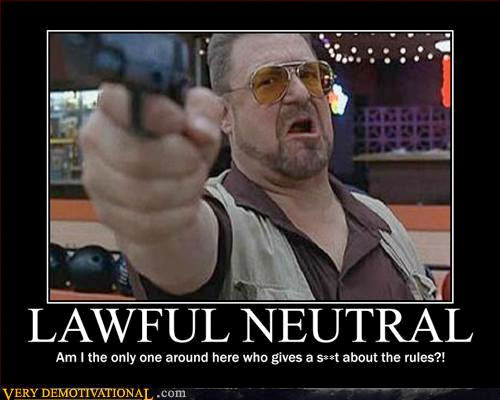Chaotic Good, in my experience, is one of the more popular choices for the good-aligned PC. It allows a player to be a good guy without feeling constrained by being a goody-two-shoes. Lots of players would rather be Han Solo: the scoundrel loner who has a heart of gold but is just as willing to sneak attack a bounty hunter from under the table if need be.
Far be it for me to denigrate such lofty ambitions. Let's face it, we'd all be Han Solo if we could. But before we end up with a whole party full of scruffy-looking nerf-herders, let's explore some options.
Chaos is, of course, the opposite of Law. It is randomness and unpredictability instead of organization and order. For a lot of people, chaos equates to freedom; they are not bound to any kind of code or set of rules.
But, in many ways, this outlook is closer to neutrality. Chaos is not just the absence of rules, but it is an active opposition to the idea of law. If you simply don't care about obeying the law, you still will end up obeying the law some of the time, just because it ends up working in the same line of your own beliefs. For example, you might not care if it's against the law to kill an unarmed peasant. You're not going to do that anyway, because you're Good. So, by default, you're being lawful.
 This, in my opinion, is also closer to what Robin Hood would be. He is often touted as the quintessential CG character, but I'd argue he's more Neutral Good. He steals from the rich and gives to the poor, not because he wants to abolish the laws of property and ownership, but because he wants to set right a greater evil. He's not against all laws, and I'd assume that if there were a way to set right the corrupt system without having to steal, he'd do that (he does come from a landed noble family, after all, so he does have some stock in "the system").
This, in my opinion, is also closer to what Robin Hood would be. He is often touted as the quintessential CG character, but I'd argue he's more Neutral Good. He steals from the rich and gives to the poor, not because he wants to abolish the laws of property and ownership, but because he wants to set right a greater evil. He's not against all laws, and I'd assume that if there were a way to set right the corrupt system without having to steal, he'd do that (he does come from a landed noble family, after all, so he does have some stock in "the system").One way to play a truly chaotic character is that they don't believe there should be laws. They think people should be free to do whatever they want, without any kind of authority trying to impose their views upon others. You want anarchy, for lack of a better term. Of course, this is a difficult interpretation of Chaos to merge with Good. Because as soon as you have anarchy, you've got people who are going to try to hurt and take advantage of others. A person of Good alignment is hardly going to propose a system where evil acts are so wanton. However, this kind of CG character might be naive, overly-optimistic, or otherwise shortsighted. They might think that the inherent goodness of people will overcome, and that is why it is okay to work towards anarchy.
Another type of chaotic character is going to be the opposite of the OCD-type of lawful character. This type of chaotic PC might be scatter-brained, ADD, or otherwise unable to think and act in "straight lines." This character is still Good, because they mean well, but maybe they are absent-minded or otherwise mentally disheveled. They are not lawful because they can't seem to get their mind around the rules, and they can't think in an orderly fashion. They're still going to try to do good--they probably don't want to break the law--but they just can't keep it all straight. This person is chaotic more by psychology than by philosophy.
Just remember: as with Law, Chaos should be defined not by how others view the concept of law and order, but how the PC interprets it. Chaotic Good can offer some wonderful roleplaying opportunities for a player to butt heads against kings and cities, as they try to do good but run afoul of the prescribed rules of the land. Just make sure that the player does not run off with the idea of being Chaotic and lose sight of what it means to be Good.










